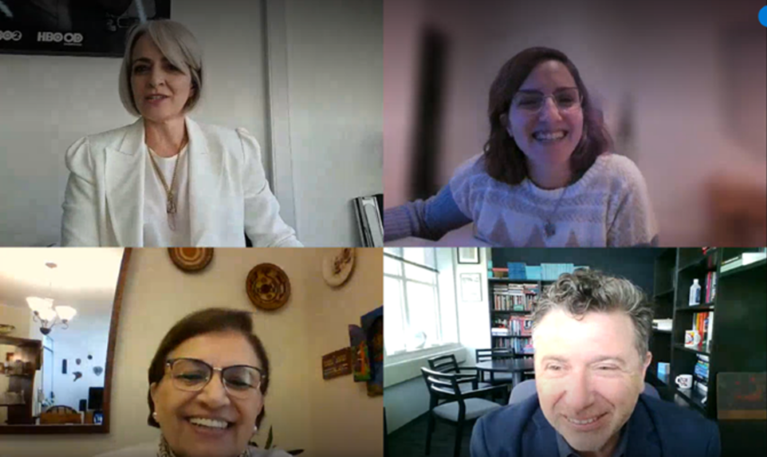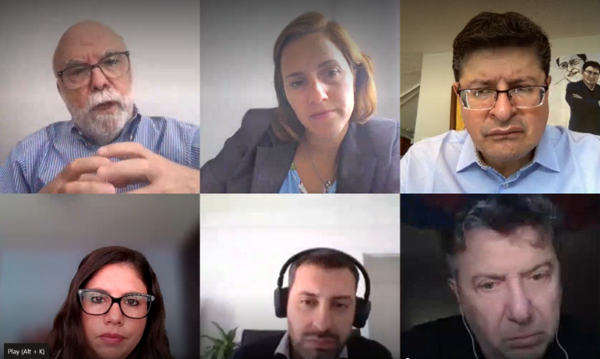CREDIBLE Panel Series: Three ways to stem manipulative narratives in Latin America and the Caribbean

On April 28th and June 24th 2022, CREDIBLE convened a group of renowned academics and practitioners for a discussion on disinformation trends in Latin America and the Caribbean. These panels were organized by IREX to discuss current trends and opportunities in this field, as it conducts country-specific interventions to strengthen media and information ecosystems.
Participants included IREX’s partners in Guatemala, Peru, and the Dominican Republic. USAID mission representatives, representatives of the Steering Oversight and Leadership (SOL) Teams (youth advisory groups for CREDIBLE’s activities), and other stakeholders from the media and journalism sector also joined the session.
Main takeaways
Disinformation travels fast, especially when its spread is intentional. Alternatively, clarifying or denying manipulative narratives is complex and time consuming. Facts do not always spread with the same ease as inaccurate information and governments do not always have publicly available information to offer a credible benchmark for citizens to form an evidence-based opinion. The vacuum of credible and reliable information in Latin American and Caribbean countries, including limited access to reliable public information, provides bad actors with the opportunity to promote division and mistrust through the distribution of disinformation.
In our discussions, we highlighted the following three ways to stop the spread of manipulative information:
1. Utilize social media to confront and dispel disinformation
Journalists have traditionally been producers of quality information, but at present they are far from the single source of information. Simultaneously, regional media outlets are facing critical challenges to their sustainability, leaving social media to be the go-to source of information for many, especially youth.
Social media platforms provide youth with access to a plethora of information, the ability to express diverse ideas, and a mechanism to use their voices to confront disinformation while participating in an open dialogue.
In this context, César Ricaurte of Fundamedios suggests more needs to be done to create a “digital citizenry”, that is conscious not just of its digital rights, but also of its duties in this space. He argues strengthening media and digital literacy is crucial, as young citizens need to improve their grasp of how information is gathered, produced, shared, and used for decision-making.
2. Create models of resiliency among youth
Digital platforms have committed to improve, but their blind eye to the disinformation problem has caused trouble for a long time – especially as antidemocratic actors seek to “use democracy to undermine democracy itself”, as Rosental Alves, founder of the Knight Center for Journalism in the Americas, explains the efforts to inject public debate with disinformation to sow mistrust in others and on facts themselves.
Youth taking active positions against disinformation and manipulated information should be embraced as a social norm that can foster a strong foundation of resiliency among the youth population. Critical moments, such as the COVID-19 pandemic and elections, can be pivotal opportunities to empower young people to take an active role by supporting their interaction with the information ecosystem and its diverse set of tools.
Therefore, youth need to improve their abilities to discern the information they receive, better understand how to react to it, and influence others in their close networks to do the same. “This way, they can become a multiplier force for better discernment and take on a more active role against disinformation, within their own spaces”, emphasized CREDIBLE’s Diana Rodriguez, who highlighted the Learn2Discern approach as it is being adapted to the Americas.
3. Harness empathy and diversity in public debate
Independent media needs to be embraced and diverse voices need to be woven into public conversation. Fact-checking works efficiently when crowdsourced and nudging people to be more aware of the importance of accuracy and verification will support the halting of misinformation. For these methods to be effective, it is crucial to consider the emotional drivers of why individuals engage with dis/misinformation.
Building on just over a decade of fact-checking work, Chequeado’s Matias de Santi argues empathy is a crucial tool to enhance the effectiveness of efforts to promote evidence-based discourse. While fact-checking and media literacy interventions have been a necessary backstop to the barrage of disinformation around the globe, the lesson is that: “common citizens don’t have time, have other things to do, and regularly don’t have the tools to verify information”, so it is important to understand this and begin building bridges before offering facts. This means tried-and-tested tools need to become more humane and consider how individuals process information, both cognitively and emotionally. This implies a greater understanding of the local context, the social networks people are a part of, and how this connects to their identity.

“Opening opportunities for dialogue, education, and training must begin from empathy”, says Alves. As disinformation affects certain groups of people disproportionally –women, youth, elders, and members of ethnic or linguistic minorities–, they need to be engaged as changemakers in this field as well. "Their voices need to be heard more, and their needs should be considered in all interventions in this space", Rodríguez explained. Fostering trust, engagement, and participation – particularly among youth – is key.
The panelists of this event included: Silvio Waisbord (Director and Professor, School of Media and Public Affairs, George Washington University), Estela Roeder Carbo (Professor of Universidad de Lima), and Adriana Amado (President of ''infociudadana.org''), Rosental Alves (founder of the Knight Center for Journalism in the Americas) Matías Di Santi (Director at Chequeado), Diana Rodriguez (CREDIBLE Program Officer), and Cesar Ricaurte (Director of Fundamedios). The session was moderated by Laura Agosta (CREDIBLE Chief of Party) and participants were encouraged to ask questions and participate.
CREDIBLE is working to transform the way young people in Latin America and the Caribbean interact with their information environment, creating resilience to mis- and disinformation, and ultimately empowering youth to engage in fact-based discourse and decision-making. For more information, visit our project page.